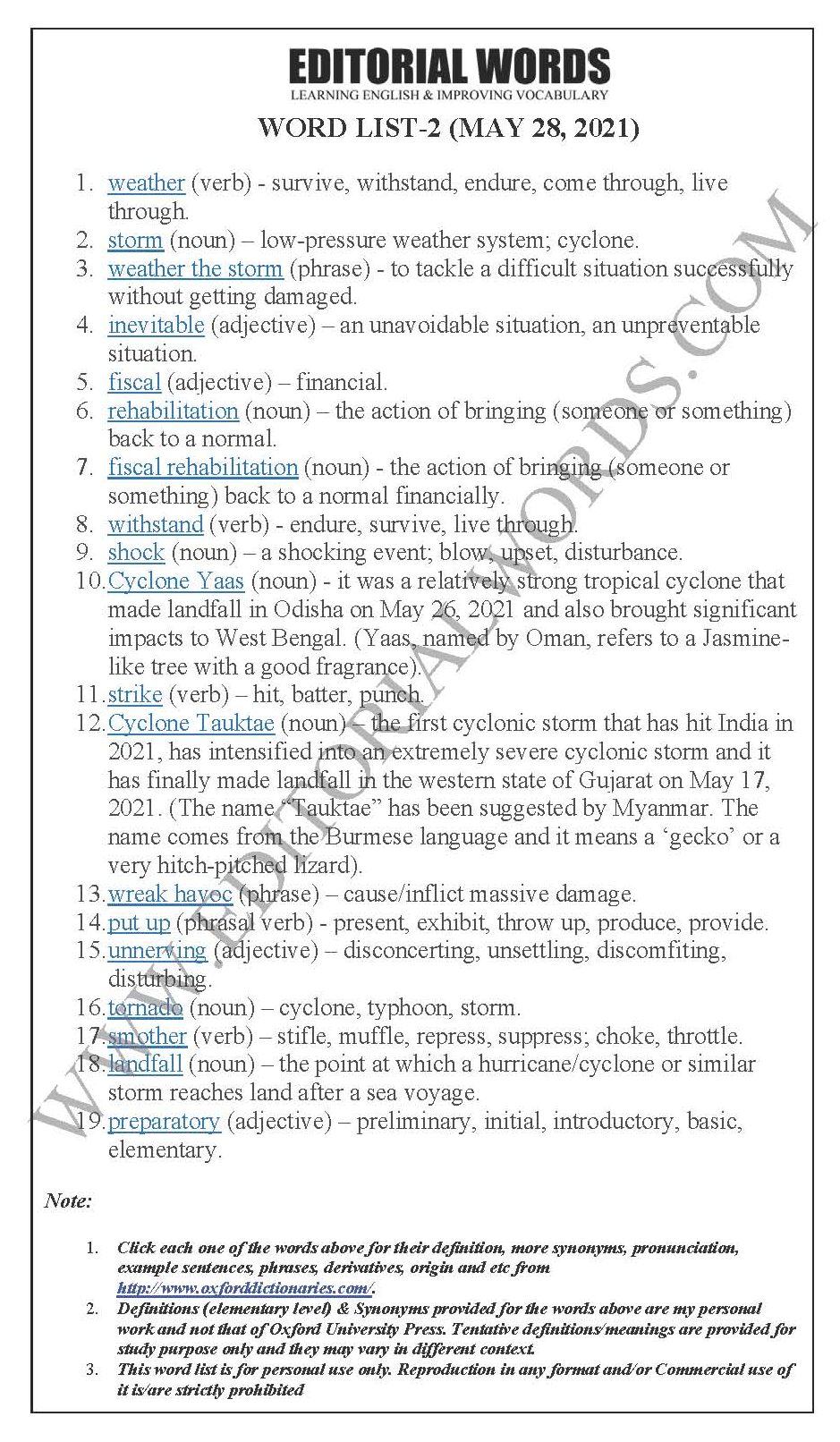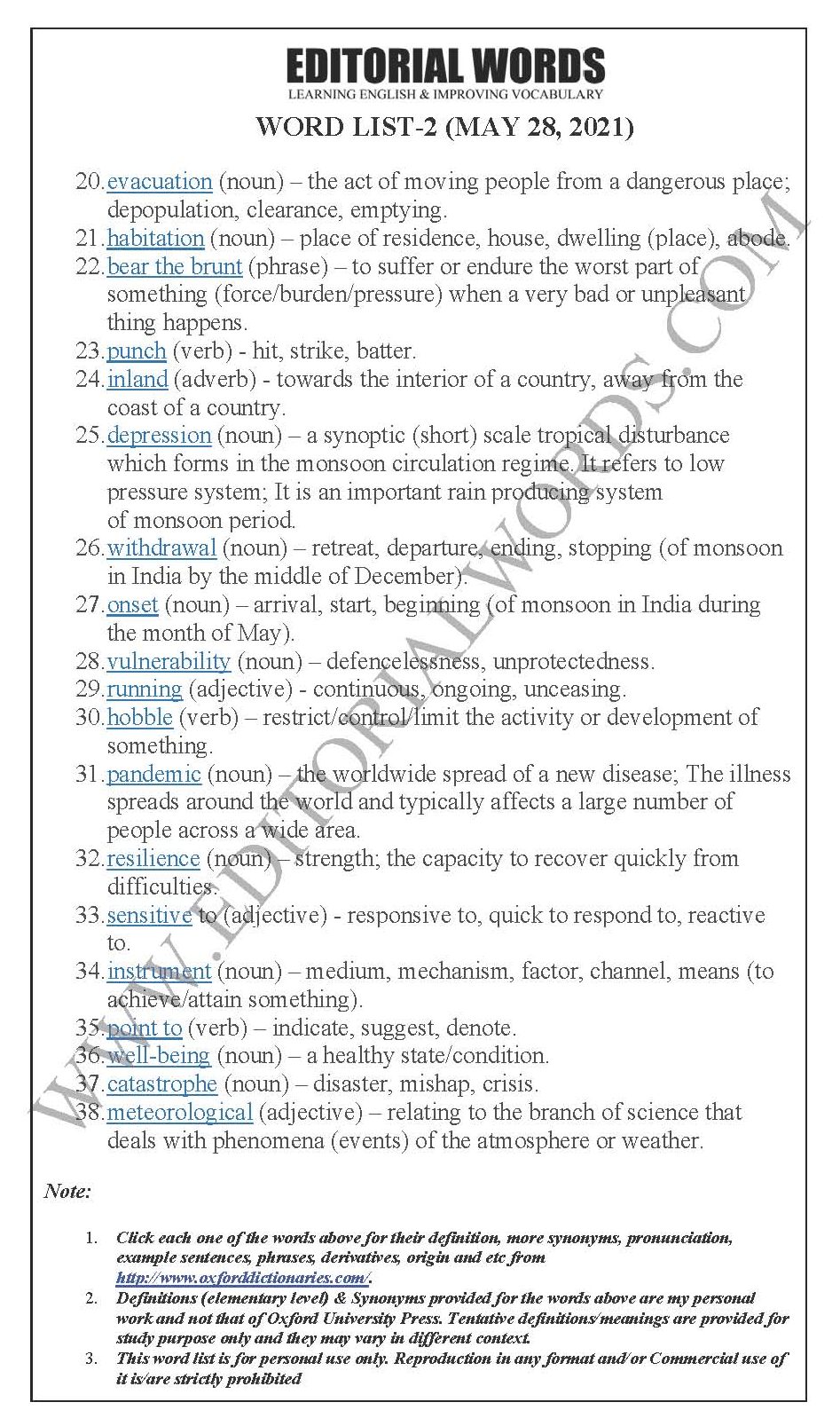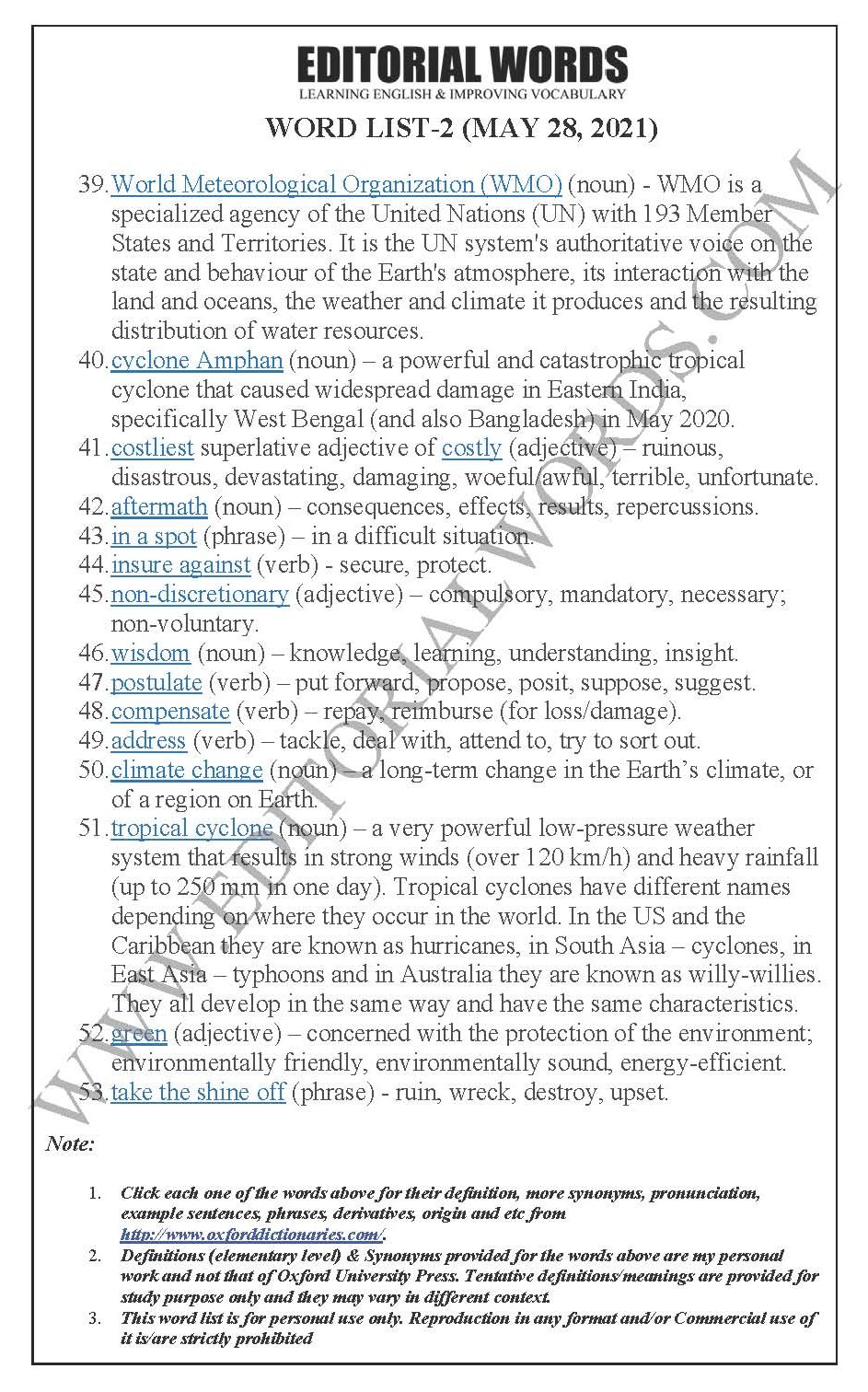The Hindu Editorial (Weathering storms) – May 28, 2021
India’s capacity to withstand multiple, near-simultaneous shocks is being tested, with a Very Severe Cyclonic Storm, Yaas, striking Odisha, just a week… For further reading, visit “The Hindu”. Below is today’s word list-2 for The Hindu Editorial (Weathering storms) – May 28, 2021.
To read this article, click here.
This preview is provided here with permission.
Courtesy: The Hindu
The Hindu Editorial (Weathering storms) – May 28, 2021:
- weather (verb) – survive, withstand, endure, come through, live through.
- storm (noun) – low-pressure weather system; cyclone.
- weather the storm (phrase) – to tackle a difficult situation successfully without getting damaged.
- inevitable (adjective) – an unavoidable situation, an unpreventable situation.
- fiscal (adjective) – financial.
- rehabilitation (noun) – the action of bringing (someone or something) back to a normal.
- fiscal rehabilitation (noun) – the action of bringing (someone or something) back to a normal financially.
- withstand (verb) – endure, survive, live through.
- shock (noun) – a shocking event; blow, upset, disturbance.
- Cyclone Yaas (noun) – it was a relatively strong tropical cyclone that made landfall in Odisha on May 26, 2021 and also brought significant impacts to West Bengal. (Yaas, named by Oman, refers to a Jasmine-like tree with a good fragrance).
- strike (verb) – hit, batter, punch.
- Cyclone Tauktae (noun) – the first cyclonic storm that has hit India in 2021, has intensified into an extremely severe cyclonic storm and it has finally made landfall in the western state of Gujarat on May 17, 2021. (The name “Tauktae” has been suggested by Myanmar. The name comes from the Burmese language and it means a ‘gecko’ or a very hitch-pitched lizard).
- wreak havoc (phrase) – cause/inflict massive damage.
- put up (phrasal verb) – present, exhibit, throw up, produce, provide.
- unnerving (adjective) – disconcerting, unsettling, discomfiting, disturbing.
- tornado (noun) – cyclone, typhoon, storm.
- smother (verb) – stifle, muffle, repress, suppress; choke, throttle.
- landfall (noun) – the point at which a hurricane/cyclone or similar storm reaches land after a sea voyage.
- preparatory (adjective) – preliminary, initial, introductory, basic, elementary.
- evacuation (noun) – the act of moving people from a dangerous place; depopulation, clearance, emptying.
- habitation (noun) – place of residence, house, dwelling (place), abode.
- bear the brunt (phrase) – to suffer or endure the worst part of something (force/burden/pressure) when a very bad or unpleasant thing happens.
- punch (verb) – hit, strike, batter.
- inland (adverb) – towards the interior of a country, away from the coast of a country.
- depression (noun) – a synoptic (short) scale tropical disturbance which forms in the monsoon circulation regime. It refers to low pressure system; It is an important rain producing system of monsoon period.
- withdrawal (noun) – retreat, departure, ending, stopping (of monsoon in India by the middle of December).
- onset (noun) – arrival, start, beginning (of monsoon in India during the month of May).
- vulnerability (noun) – defencelessness, unprotectedness.
- running (adjective) – continuous, ongoing, unceasing.
- hobble (verb) – restrict/control/limit the activity or development of something.
- pandemic (noun) – the worldwide spread of a new disease; The illness spreads around the world and typically affects a large number of people across a wide area.
- resilience (noun) – strength; the capacity to recover quickly from difficulties.
- sensitive to (adjective) – responsive to, quick to respond to, reactive to.
- instrument (noun) – medium, mechanism, factor, channel, means (to achieve/attain something).
- point to (verb) – indicate, suggest, denote.
- well-being (noun) – a healthy state/condition.
- catastrophe (noun) – disaster, mishap, crisis.
- meteorological (adjective) – relating to the branch of science that deals with phenomena (events) of the atmosphere or weather.
- World Meteorological Organization (WMO) (noun) – WMO is a specialized agency of the United Nations (UN) with 193 Member States and Territories. It is the UN system’s authoritative voice on the state and behaviour of the Earth’s atmosphere, its interaction with the land and oceans, the weather and climate it produces and the resulting distribution of water resources.
- cyclone Amphan (noun) – a powerful and catastrophic tropical cyclone that caused widespread damage in Eastern India, specifically West Bengal (and also Bangladesh) in May 2020.
- costliest superlative adjective of costly (adjective) – ruinous, disastrous, devastating, damaging, woeful/awful, terrible, unfortunate.
- aftermath (noun) – consequences, effects, results, repercussions.
- in a spot (phrase) – in a difficult situation.
- insure against (verb) – secure, protect.
- non-discretionary (adjective) – compulsory, mandatory, necessary; non-voluntary.
- wisdom (noun) – knowledge, learning, understanding, insight.
- postulate (verb) – put forward, propose, posit, suppose, suggest.
- compensate (verb) – repay, reimburse (for loss/damage).
- address (verb) – tackle, deal with, attend to, try to sort out.
- climate change (noun) – a long-term change in the Earth’s climate, or of a region on Earth (Courtesy: NASA).
- tropical cyclone (noun) – a very powerful low-pressure weather system that results in strong winds (over 120 km/h) and heavy rainfall (up to 250 mm in one day). Tropical cyclones have different names depending on where they occur in the world. In the US and the Caribbean they are known as hurricanes, in South Asia – cyclones, in East Asia – typhoons and in Australia they are known as willy-willies. They all develop in the same way and have the same characteristics. (Courtesy: BBC)
- green (adjective) – concerned with the protection of the environment; environmentally friendly, environmentally sound, energy-efficient.
- take the shine off (phrase) – ruin, wreck, destroy, upset.
Note:
1. Click each one of the words above for their definition, more synonyms, pronunciation, example sentences, phrases, derivatives, origin and etc from http://www.oxforddictionaries.com/.
2. Definitions (elementary level) & Synonyms provided for the words above are my personal work and not that of Oxford University Press. Tentative definitions/meanings are provided for study purpose only and they may vary in a different context.
3. This word list is for personal use only. Reproduction in any format and/or Commercial use of it is/are strictly prohibited.
The Hindu Editorial (Weathering storms) – May 28, 2021:



“Phrasal Verbs” We Learnt Last Week
“Idioms & Phrases” We Learnt Last Week
“Important Definitions” We Learnt Last Week
Recent Word Lists For The Hindu Editorial Articles

Be the first to comment